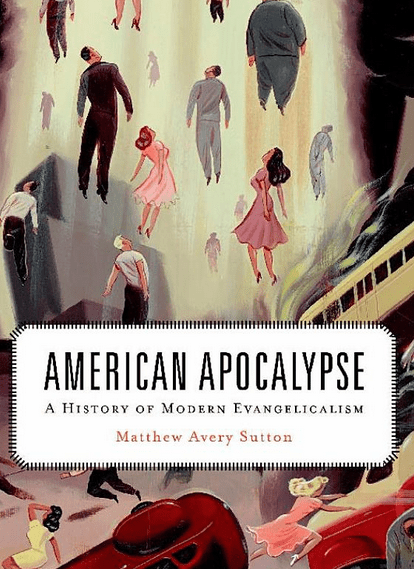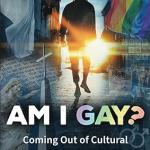 At the heart of Matthew Avery Sutton’s sketch of evangelicalism (American Apocalypse) is the conclusion that at its heart evangelicalism was an apocalyptic movement. That commitment to apocalyptic thinking gave to evangelicalism a template to understand the realities of American history: whether it was rise of drinking and the Prohibition, the threat of communism, WWII, nuclear explosions, and the various social and moral tensions that created fear among evangelicals about the direction of the nation — each of these could be factored into an apocalyptic mode of understanding history.
At the heart of Matthew Avery Sutton’s sketch of evangelicalism (American Apocalypse) is the conclusion that at its heart evangelicalism was an apocalyptic movement. That commitment to apocalyptic thinking gave to evangelicalism a template to understand the realities of American history: whether it was rise of drinking and the Prohibition, the threat of communism, WWII, nuclear explosions, and the various social and moral tensions that created fear among evangelicals about the direction of the nation — each of these could be factored into an apocalyptic mode of understanding history.
The Rapture, the Second Coming, the coming Final Judgment… these themes could be manipulated or used in ways that gave both urgent meaning to what one believed and a sense that decision was ultimate.
Sutton’s book is by a historian who — and I don’t think this is ironic — contends evangelicalism at its very heart is a kind of historiography, a way of reading life and events and history in a way that provides meaning to life as we experience it. To be an evangelical of this sort then means one is an apocalyptic historiographer. My critique of the book is that he focuses on apocalyptic voices in the history of American evangelicalism and has become tone deaf to non-apocalyptic voices. But one thing this book convinced me of: there has always been a strong apocalyptic theme in American evangelicalism. For some it defined the whole; for others it was central or at least a healthy part of the mix; for others it just didn’t factor in at all.
But I propose Sutton has overcooked the story of evangelicalism in the apocalyptic direction. Not only does he have to minimize some significant voices (e.g., J Gresham Machen, the Dutch Reformed tradition in Grand Rapids, the Restorationist tradition — where has the Wesleyan and Nazarene tradition been on this one?, and the more professional and professorial types that exploded in numbers in the 1960s-1980s seemed over time to eschew the apocalyptic approach), but I have an experience to tell:
I taught for 12 years at Trinity Evangelical Divinity School and prior to that was a student for most of four years along with a year as an adjunct teacher. I was there from 1976 to 1995. It would be fair to say TEDS was an evangelical institutional seminary. It would also be more than fair to say that this so-called apocalyptic mindset was at best a minor theme and often not even heard. I never once heard an apocalyptic sermon in chapel; no one on our faculty wrote a book remotely close to an apocalyptic reading of American history; my colleagues — or the ones I knew the best — were not a part of this apocalyptic approach; we had plenty of premillennial professors but the apocalyptic approach was not a dominant hermeneutic of any of them, not even Paul Feinberg. I don’t think I’m overstating it in this description but I can say without a doubt that TEDS in those approximate twenty years did not produce apocalyptic ministers for the churches. My point: if a flagship evangelical school like TEDS doesn’t express this apocalyptic approach then it can’t be the core of the defining reality as Sutton wants to make it.
Is the apocalyptic mindset a part of evangelicalism today?
This apocalyptic mindset can be traced from the late 19th Century all the way to the end of the 20th Century, but the author contends it has waned — you agree? If so, why?
As evangelical influence and power has skyrocketed, the faithful have invested more and more time in working toward achieving the kingdom of God in this world rather than in preparing humanity for the next. The result has been a waning emphasis on the imminent second coming of Christ. Some of the most famous evangelical preachers in the nation no longer talk about a soon-coming apocalypse. Despite their premillennial roots, suburban megachurch gurus and best-selling authors such as Joel Osteen, Rick Warren, and T. D. Jakes, to name but three examples, offer therapeutic solutions to life’s mundane problems; they do not spend time exploring doomsday scenarios. The evangelical left has also continued to grow since the 1970s. Its leaders encourage followers to engage responsibly with this world rather than to obsess over when (or if) they will be raptured into the next. New movements have emerged out of evangelicalism as well, including the postmodernism, postevangelical “emerging church,” which rejects premillennialism, and a revived, staunchly conservative version of postmillennialism called Christian Reconstruction. Nevertheless, apocalyptic premillennialism has succumbed neither to the Antichrist nor to competing theologies. Like a phoenix rising from the ashes, premillennialism reappears whenever tragedy strikes.
Or has it waned?
No event illustrates this better than the terrorist attacks on the United States of September 11, 2001. As Americans struggled to make sense of the horrific tragedy, some elite evangelical leaders preached caution. Christianity Today editors, for example, made few explicit links between the attacks and doomsday beliefs. “I try to avoid end-times prophecy,” Watergate felon and popular Christian leader Chuck Colson wrote in his regular Christianity Today column after 9/11, “that makes Christians appear irrelevant to the world.” In fact, premillennialism rarely appears on the pages of this magazine anymore. But Christianity Today’s was not the only response to the tragedy. Chuck Smith, leader of the highly successful Calvary Chapel movement, warned his parishioners that they had better repent before time ran out. Bishop G. E. Patterson of the Church of God in Christ admonished his flock that this “could very well be the beginning of the countdown that will lead to the final world conflict.” John Hagee, a Texas minister who in recent years has authored numerous best-selling apocalyptic screeds, interpreted the 9/11 attacks as the opening of World War III and the beginning of the end. In the days immediately following the attack, laypeople turned to books in search of answers, emptying stores of their stocks of evangelical prophecy manuals and apocalyptic novels. A few weeks later Americans made the new Left Behind novel—Desecration: Antichrist Takes the Throne, which hit store shelves that October — the best-selling hardcover novel of the year (368-369).
The reason why this has begun to wane is, I submit, because many of us know they were all wrong all the time and it now appears to be a kind of politico-charged spiritual rhetoric rather than genuine discernment.
















